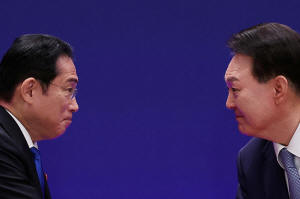Japan's departing Kishida sends signal to successor with South Korea
summit
 Send a link to a friend
Send a link to a friend
 [September 05, 2024]
By Hyonhee Shin, John Geddie and David Brunnstrom [September 05, 2024]
By Hyonhee Shin, John Geddie and David Brunnstrom
SEOUL/TOKYO/WASHINGTON (Reuters) -When Japan's outgoing Prime Minister
Fumio Kishida holds a final summit this week with South Korean President
Yoon Suk Yeol, he will be sending a signal of support not only to the
neighboring nation, but his would-be successors as well.
Prodded by U.S. President Joe Biden, the two leaders orchestrated an
about-face in ties that had sunk to their lowest level in decades amid
acrimonious diplomatic and trade disputes over Japan's occupation of
Korea from 1910 to 1945.
But the strength of their new partnership is set to be tested by
Kishida's imminent departure and the prospect of a shake-up in the White
House with November's presidential election.
"Prime Minister Kishida may have to show that what he did with President
Yoon is the right direction and he expects whoever succeeds him to
follow the current direction of the Japan-Korea relationship," said
Tetsuo Kotani, a senior fellow at the Japan Institute of International
Affairs.
As Kishida's response to Yoon's overtures had spurred pushback from
Japan's political right, his successor could face pressure from
conservatives to take a harder line, Kotani added.

"We know that in the past, that when Japan and Korea have found their
way to rapprochement, political change has sometimes contributed to
setback, or set the conditions for setback," a senior U.S.
administration official said.
"So while... our confidence is high in the future of our relationship
with Japan and all of our multilateral engagements, Kishida’s step here
is really important," added the official, who sought anonymity in
discussing diplomatic matters.
While few major announcements are expected from the summit, officials
said they saw Kishida's final visit to Seoul as crucial to U.S. efforts
to present a unified front against challenges from neighboring North
Korea and China.
Kishida's visit is not just a signal of support and thanks to Yoon, but
also a message to the Japanese government and prime ministerial
candidates that the partnership has to be a lasting part of Tokyo's
foreign policy, the U.S. official added.
Japan's ruling Liberal Democratic Party will hold elections on Sept 27
to choose Kishida's successor.
Last year U.S. President Joe Biden invited Yoon and Kishida to Camp
David where the three leaders committed to deepen military and economic
co-operation.
They also delivered their strongest joint condemnation yet of "dangerous
and aggressive behavior" by China in the disputed busy waterway of the
South China Sea.
The Camp David initiatives were explicitly designed to prompt long-term
partnership so that "no one of us would have an incentive to pull away
from that deeper co-operation if political change did happen," the U.S.
official said.
[to top of second column]
|

South Korean President Yoon Suk Yeol shakes hands with Japanese
Prime Minister Fumio Kishida during a joint press conference in
Seoul, South Korea, May 27, 2024. REUTERS/Kim Hong-Ji/Pool/File
Photo

Yoon has said the partnership will remain effective in part because
of the diplomatic pacts both sides had adopted.
"There could always be some anxiety about the new prime minister,
especially given the personal synergy between the two leaders," said
a senior South Korean government official who sought anonymity to
discuss sensitive diplomatic matters.
"But the fundamentals of relations won’t change, and Kishida’s visit
will reaffirm the significance of having good relations with Korea
and could send a message to the incoming leader, whoever that might
be."
'STRONG REQUEST'
Kishida made a "strong request" to see Yoon a final time before he
leaves office, the South Korean official said.
The summit is expected to yield a memorandum of understanding on
evacuating civilians from each other's countries during emergencies
in third countries, he added.
The South Koreans hope for conciliatory comments from Kishida about
Koreans forced to work for Japan during its occupation, but even
without these the visit could help to keep "shuttle diplomacy" on
track, he said.
Tokyo wants to broaden ties to reach a "more dynamic phase", a
Japanese foreign ministry official told a briefing, without
elaborating.
Yoon's moves have not always been popular at home, where many
believe Japan has not done enough to atone for its occupation, which
included forced labor and other abuses.
Japan says the issues were resolved by a treaty that normalized
relations in 1965, but some South Korean governments and court
rulings have disputed that.
"From Japan's point of view, the concern is about the continuity of
South Korea's foreign policy after the change of the current
government in Seoul," said Kim Hyoung-zhin, the South's former
ambassador to the European Union and NATO.

"You can say the same for Korea about the changes of government in
Tokyo."
(Reporting by Hyonhee Shin in Seoul, David Brunnstrom in Washington,
and John Geddie in Tokyo; Additional reporting by Tim Kelly in Tokyo
and Josh Smith in Seoul; Writing by Josh Smith; Editing by Clarence
Fernandez)
[© 2024 Thomson Reuters. All rights
reserved.]This material
may not be published, broadcast, rewritten or redistributed.
Thompson Reuters is solely responsible for this content. |